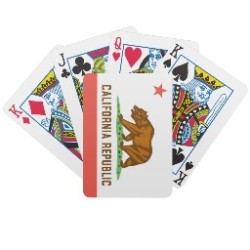California Tribes Poker Only Agreement Bad News For PokerStars

Following years of disagreement, on Tuesday California moved a step closer to legalized online poker after 13 of the state’s most important gambling tribes signed a unified online poker bill and sent it onto the California legislature. Up until now, California’s tribal gaming interests had been unable to agree a common approach to online poker but all sides have now lent their support to the new bill which would permit only current casino and poker room operators the ability to offer poker online. As the 13 tribes wrote in a letter accompanying the unified online poker bill to the state legislature:
“In achieving consensus for Internet poker, we reaffirm our commitment to the longstanding principle of limited gaming that has guided California’s public policy toward gaming. As importantly, we recommit ourselves to realizing legislation that protects children and the vulnerable, creates jobs for Californians, provides additional revenues for state services, and safeguards consumers and the vulnerable from dishonest and unsuitable operators.”
Absent from the consensus, however, was consent from the Morongo Band of Mission Indians, who took exception to the inclusion of a “bad actor” clause in the bill which would then shut its chosen online poker partner, PokerStars, out of a future regulated state industry.
Unified bill vital for passing legislation in 2014
Currently California has two online poker bills awaiting action in the legislature, one in the Assembly and the other in the Senate. The online poker bill which the 13 tribes have now just signed, called “The Internet Poker Consumer Protection Act of 2014,” was subsequently addressed and sent to the two bills’ sponsors, namely State Senator Lou Correa and Assemblyman Reginald Jones-Sawyer.
Even though the bill was signed by just 13 of The Golden State’s 60 plus tribes with gambling interests, the remaining tribes are significantly less influential in the industry and so lack the political power to derail the bill, with the exception of possibly the Morongo Band of Mission Indians.
Online poker limited to card rooms and qualified tribes
According to the unified online poker bill, only those “qualified federally recognized California Indian tribe” or “card rooms” will be considered for an operator’s licenses, and if approved would subsequently be granted a maximum of two skins per license. As a result, the state’s racing industry will not be elegible for consideration.
Bad Actors clause bad news for PokerStars
Also included in the proposed bill is a bad actor clause which prohibits any online poker operator who flaunted the UIGEA of 2006 from entering the Californian market. This would spell bad news for PokerStars which thus far has found itself similarly locked out of the other regulated US states of Nevada, New Jersey, and Delaware.
Naturally, the bad actor language was something the Morongo Band of Mission Indians was keen to avoid as it had hoped to gain a huge advantage over the rest of its competitors by forming a partnership with PokerStars, who would then not only provide an online poker platform, but would be the tribe’s front-facing brand. Following announcement of the new bill, the Morongo tribe along with other card rooms involved in the PokerStars deal, namely the Commerce Club, Hawaiian Gardens Casino and the Bicycle Casino, issued a statement indicating their intention to resist the pending piece of legislation. As the Morongo Coalition, commented:
“Efforts by a select few interests to rewrite longstanding and effective policy in order to gain a competitive market advantage or to lock out specific companies is not in the best interests of consumers or the state and will be vigorously opposed by our coalition, online poker players and many others.”
Other highlights of the draft bill
According to the piece of potential legislation, legalized online poker would be adopted in California within a 180 day period, with the first round of operator licenses taking effect after one year. Those operators would then have to pay a one-off licensing fee of $5 million, after which a 5% tax on GGR would be levied on companies. In addition, a further “regulatory fee” would have to be paid, which would then placed in the Internet Poker Fund to go towards “the reasonable costs of license oversight, consumer protection, state regulation, problem gambling programs.”
Finally, only players aged 21+ will be allowed to take part in real money poker games, and players breaking the law or gambling on unlicensed, offshore sites could be subsequently face misdemeanor charges.










